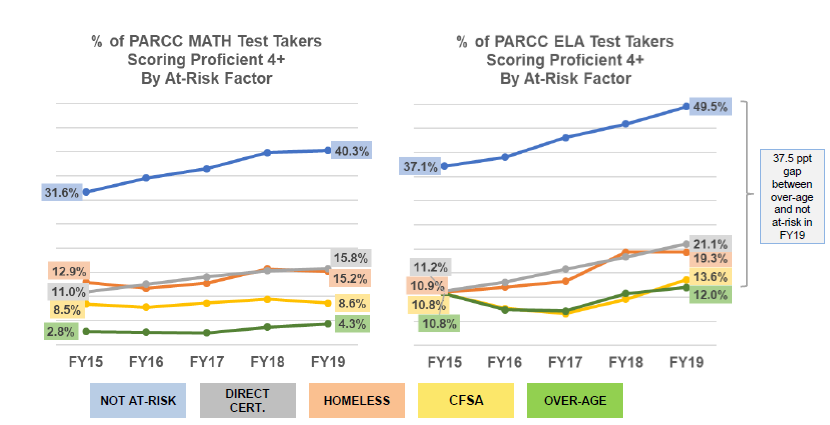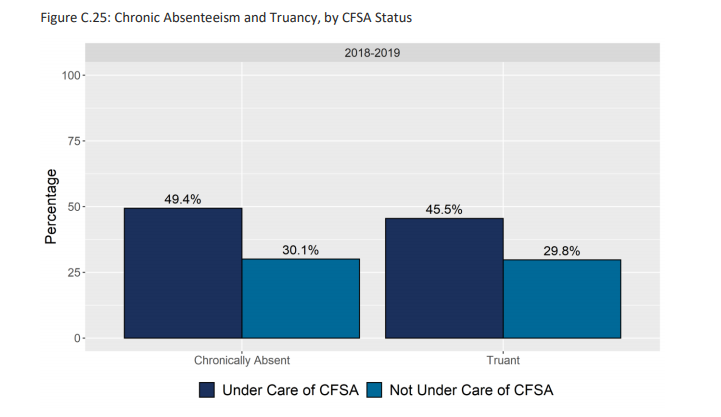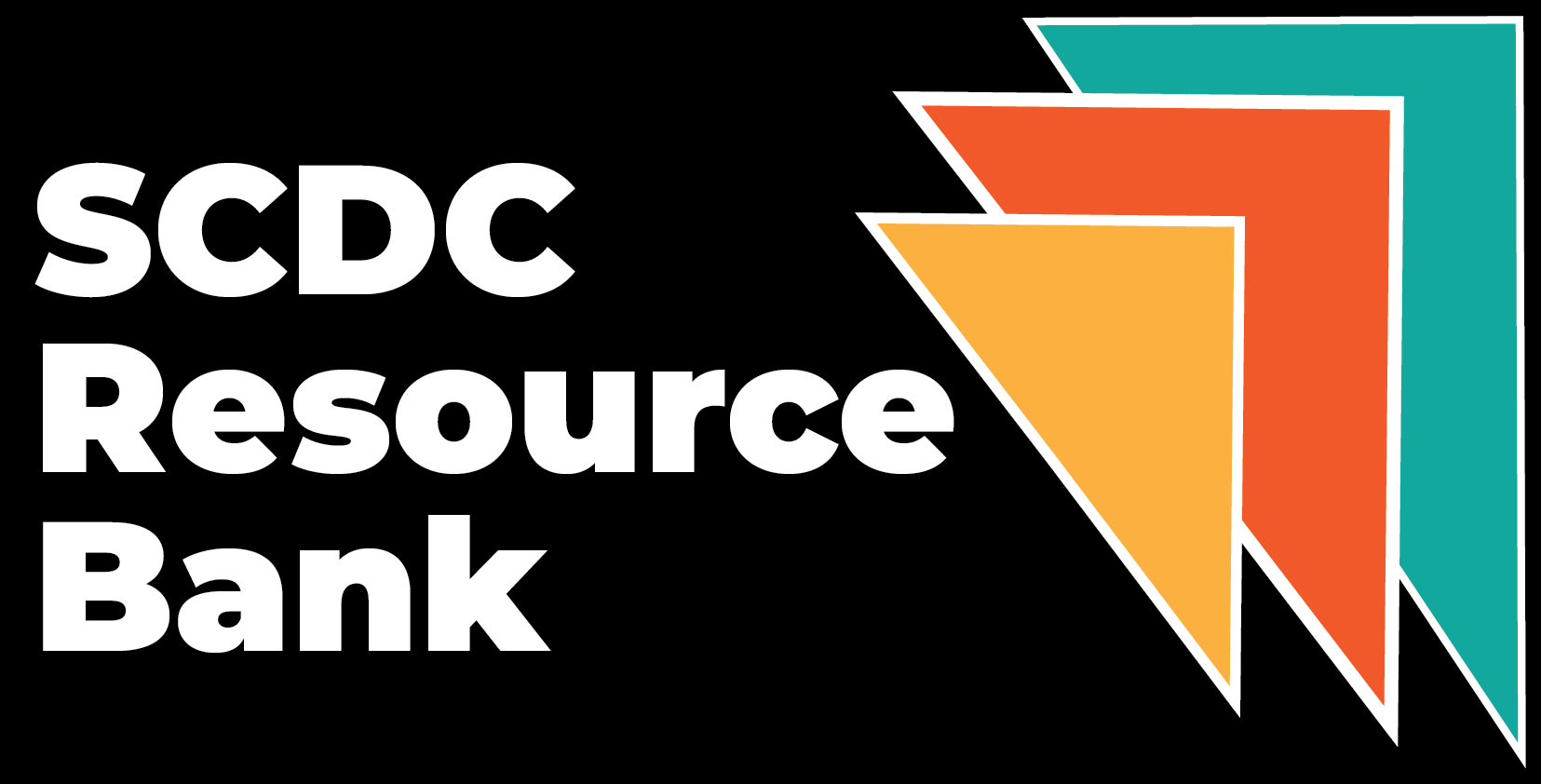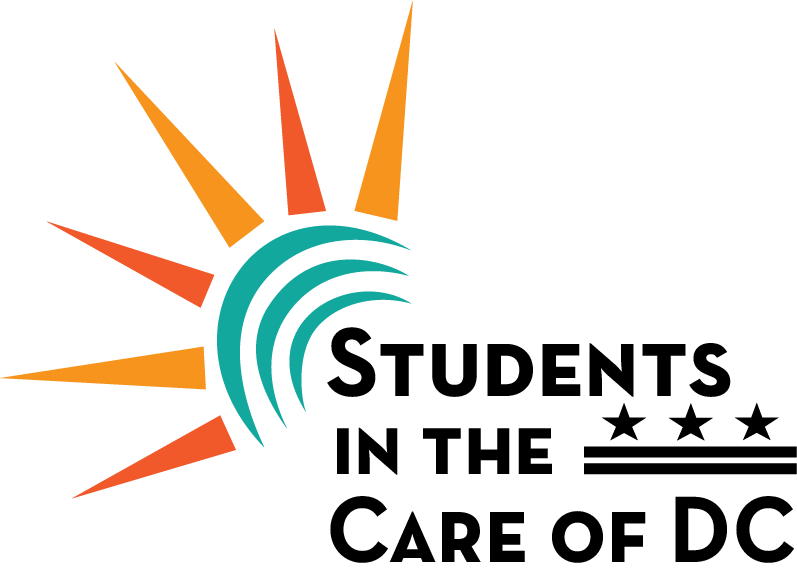Child Welfare System
What We Know:
Nationally, research has showed that students who are impacted by the child welfare system have…
- Experienced frequent school changes, with 34 percent of 17-18-year-old students having changed schools 5 or more times,
- Special education needs, with national trends suggesting that 35-47 percent of students involved in the child welfare system require special education services,
- Lower high school completion rates – 65 percent compared to the national average of 86 percent, and
- Low postsecondary educational attainment, with completion rates ranging between 3-10 percent compared to the national average of 32.5 percent.
We know that young people who are impacted by the child welfare system in the District…
Have larger proficiency gaps in math and ELA compared to both their peers in the general population and those who are defined as “at-risk” (See page 15 of the Executive Summary).

Have higher rates of chronic absenteeism and truancy, with both of these numbers continuously rising for older aged students (See page 52).

What We Do:
The Office for Students in the Care of D.C. works closely with governmental agencies and community-based partners including but not limited to CFSA, DOC, DYRS, DCPS and OSSE to respond to the educational and workforce needs of young people impacted by the child welfare system. Please refer back to this page for targeted resources, events, and opportunities as they become available.
Juvenile & Adult Justice Systems
What We Know:
National research has proven that students who are impacted by the juvenile justice system are…
- More likely to have higher suspension and expulsion rates than their peers,
- Testing below their grade levels, resulting in lower levels of literacy and numeracy skills, and
- Three times more likely to have special education needs, with over half of youth in custody being eligible for special education services.
- Additionally, for students experiencing incarceration, most facility schools are not providing the same level and quality of education and workforce skills that are made available to students in the community.
In the District, students impacted by the juvenile or adult justice system are likely to be involved in a complex system of both local and federal justice agencies…
- Over 60 percent of youth under the supervision of DYRS are in the community; therefore, there is a need for targeted support that extends past the District’s three secure facilities.
- 90 percent of youth committed to DYRS have an Individual Education Program (IEP) and either an Axis 1 or Axis 2 mental health diagnosis.
- Over half of the student scholars at Maya Angelou Academy at New Beginnings require special education services.
What We Do:
The Office for Students in the Care of D.C. works closely with governmental agencies and community-based partners including but not limited to CFSA, DOC, DYRS, DCPS and OSSE to respond to the educational and workforce needs young people impacted by the juvenile and adult justice systems. Please refer back to this page for targeted resources, events, and opportunities as they become available.
Featured Resources:
Back on Track DC Tool
Office of the State Superintendent of Education's (OSSE) ReEngagement Center
“This website is a one-stop resource for District residents of all ages who want to get back on track with their plans to pursue a secondary education credential and a career pathway. Users can access up-to-date and reliable information about alternative and adult-serving education programs across the District." Students simply can click "Find a Program Now" and answer three questions to be directed to relevant resources. More information on the DC ReEngagement Center and ways to get further involved or additional assistance can be found here.
District of Columbia Student Discipline Guide: A Guide for Students, Families and School Staff
The Office of the Student Advocate, DC Office of the Ombudsman for Public Education, and developed in partnership with Every Student Every Day | 2020
This is a tool that clearly articulates and displays the laws related to school discipline, key terminology, one's rights (see pages 4-5), connected agencies and offices to know, and how to best self-advocate. The end of the document provides phone numbers for agencies and offices connected to student discipline.
The D.C. Reentry Navigator: Empowering You to Succeed with a D.C. Criminal Record
The Public Defender Service for the District of Columbia | January 2021
PDS recently released this 900-page, 16-chapter book that provides a comprehensive compilation of expert knowledge and reentry resources for those impacted by the justice system in the District of Columbia. One can use the table of contents (starting on page xvii) to navigate through the various chapters. A plethora of resources related to being released from BOP and DOC facilities; important tools for reentry and collecting one's identity documents; transportation questions; public benefits, healthcare, and housing resources; and specifics on education and employment are included.
Chapter 13 is focused on employment (page 555) and includes preparation assistance, access to employers who have employed individuals with records, and sample resumes. Chapter 14 is focused on education (page 643) and outlines one's educational rights and different types of programming. PDS has done a terrific job providing organizations' contact information, and enrollment and eligibility requirements in each of the sections.
SCDC Resource Bank: Student Resources
 The SCDC Resource Bank was established to be a living hub of resources, best practices, guides and other materials specifically dedicated to meeting the needs of students who are system involved. Explore the following pages to find additional resources specific to the child welfare system and the juvenile and adult justice systems.
The SCDC Resource Bank was established to be a living hub of resources, best practices, guides and other materials specifically dedicated to meeting the needs of students who are system involved. Explore the following pages to find additional resources specific to the child welfare system and the juvenile and adult justice systems.

